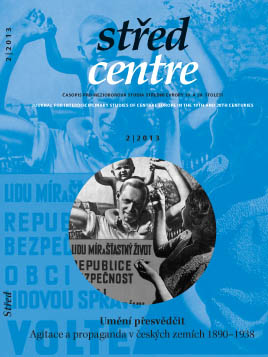Československá propaganda ve třicátých letech 20. století. Nesnadná cesta k vytvoření ministerstva propagandy
Czechoslovak Propaganda in the 1930s: Uneasy Way towards the Czechoslovak Propaganda Ministry
Author(s): Michal PehrSubject(s): History
Published by: AV ČR - Akademie věd České republiky - Masarykův ústav
Keywords: Interwar Czechoslovakia; Propaganda; Czechoslovak Propaganda Ministry; Oskar Butter; Alfred Fuchs
Summary/Abstract: This paper examines the rising significance of propaganda after the First World War and focuses in particular on how it was perceived in Czechoslovakia in the 1930s. The increasing danger posed by neighboring Nazi Germany elevated it to a conscious effort to use spiritual means to control the masses in order to help defend democratic Czechoslovakia. The paper analyzes the era’s ideas on the significance of propaganda. It focuses on discussions on the relationship between propaganda and democracy, and attempts to create a ministry of propaganda in a democratic state. Propaganda was described as an all-powerful weapon that does not kill, but is comparable with other weapons. At the time, political propaganda as such had a dual meaning – state propaganda and democratic propaganda. The paper analyzes the ideas about the significance of propaganda and how to reform it. The main question was what form should it take in a democratic system? The paper also acknowledges the Czechoslovak experts, journalists and sociologists Oskar Butter, Alfred Fuchs, Jiří Solar, Vilém Práger and others, who contributed to the scientific study of propaganda. It also focuses on discussions about the relationship between propaganda and democracy, and attempts to create a ministry of propaganda in a democratic state when these efforts came up against opinions that democracy as an ideal system of government does not need any propaganda, and that propaganda is also something unbecoming, used only by totalitarian regimes for their self-advancement. These opinions were overcome gradually and with difficulty, which is reflected in the case of the above-mentioned ministry of propaganda, created during the political crisis in the fall of 1938. This study reveals that the relevant political currents acknowledged the need to propagate Czechoslovakia and its democratic system, but disagreed on how to undertake and organize the propaganda. There were also disagreements on the leadership and influence of similar types of institutions. The decisive political powers were unwilling to concentrate radio and press under one agency until the deep international crisis struck.
Journal: Střed. Časopis pro mezioborová studia Střední Evropy 19. a 20. století
- Issue Year: 5/2013
- Issue No: 2
- Page Range: 57-76
- Page Count: 20
- Language: Czech

